Transparent Solar Cells Market Research, 2031
The global transparent solar cells market size was valued at $12.2 million in 2021, and transparent solar cells industry is projected to reach $83.5 million by 2031, growing at a CAGR of 21.3% from 2022 to 2031.
REPORT KEY HIGHLIGHTERS
- The transparent solar cells market has been analyzed in value. The value of the transparent solar cells market is analyzed in thousands.
- The transparent solar cells market report has analyzed the key strategies of the leading countries and companies related to the transparent solar cell.
- The report also provides an exhaustive list related to the completed upcoming construction projects which incorporate transparent solar cells in the buildings.
- The report also provides a brief list of the leading transparent solar cell products currently available in the market.
- Global transparent solar cells market is fragmented in nature with many players such as Heliatek, Brite Solar, Ubiquitous Energy, Inc., Onyx Solar Group LLC, SolarScape Enterprises Ltd., Xiamen Solar First Energy Technology Co., Ltd., Polysolar, PHYSEE, Sharp Corporation, and Energyglass. This report provides key strategies such as product launches, acquisitions, mergers, and expansion of transparent solar cell manufacturers.
- Conducted primary interviews with raw material suppliers, wholesalers, suppliers, and manufacturers of the transparent solar cells market to understand the market trends, growth factors, pricing, and key players’ competitive strategies.
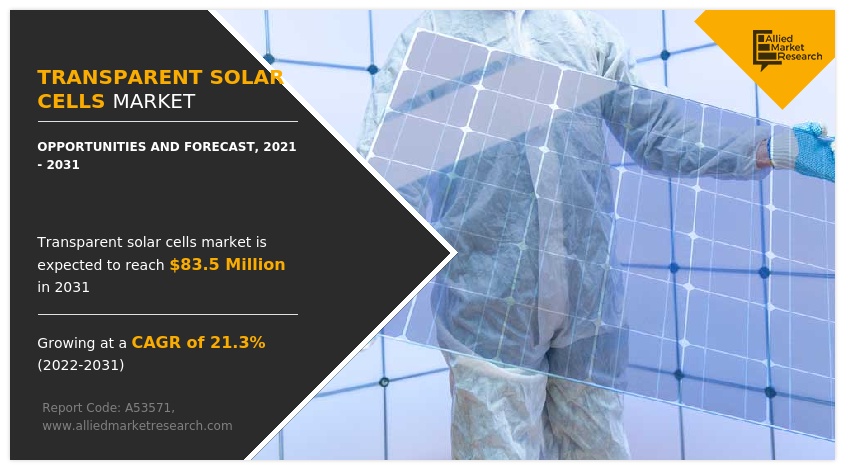
A transparent solar cell is a type of photovoltaic cell that allows visible light to pass through while simultaneously generating electricity from absorbed light in the ultraviolet and infrared spectrum.
The growth of the transparent solar cells market is driven by a rise in demand for renewable energy, advancement in technology related to transparent solar cells, and support from various government initiatives and policies. These positive factors are the major reason for the growth of the market.
Transparent solar cells are more expensive than conventional solar panels as their production costs are still quite high. This is a result of the requirement for specialized manufacturing processes and materials, such as transparent conductive oxides and transparent electrodes. These factors raise production costs, which might prevent transparent solar cells from becoming widely used, especially in markets where the price is a major factor. The above-mentioned are expected to impede the growth of the transparent solar cells market during the forecast period. However, as technology advances and production costs fall, transparent solar cells' costs are likely to approach those of conventional solar panels soon.
A New Beauty Philosophy is Intended to Promote the Transparent Solar Cells Market Growth
The use of transparent solar cells is anticipated to augment this trend, which already places aesthetics as a key component in contemporary architecture and design. Transparent solar cells have the potential to revolutionize the way people think about the aesthetic and practical design of buildings as they can produce electricity from sunlight while remaining almost invisible.
Solar panels have typically been hidden away on rooftops or in less noticeable locations as they are considered unattractive. Transparent solar cells, on the other hand, have the potential to alter this perception as they can be incorporated into building designs without detracting from their aesthetic value. Transparent solar cells can generate electricity and be both useful and beautiful by allowing sunlight to pass through. In addition, the use of transparent solar cells can support environmentally friendly and sustainable design principles. Architects and designers can contribute to a future that is less harmful to the environment by incorporating renewable energy generation into the design of buildings.
Transparent solar cells are anticipated to become more popular in the upcoming years due to their aesthetic appeal. Transparent solar cells are likely to be used in even more creative ways to design buildings and other structures as technology advances and manufacturing costs decline.
Replacement of conventional windows
Conventional windows may soon be replaced by transparent solar panels. By adding transparent solar cells to their windows, buildings can produce their electricity and become less reliant on the grid. Conventional solar panels might not be feasible in urban settings where space is at a premium cost, however, this can have significant benefits for the transparent solar cells market. Transparent solar cells can also help reduce building energy consumption by reducing the need for artificial lighting.
The less efficiency of transparent solar cells compared to conventional solar cells is one of the main obstacles to their widespread use. Transparent solar cells are still less effective than conventional solar panels, even though the technology is advancing quickly. They may become a competitive alternative to conventional solar panels with further research and development as their efficiency increases.
The price of production presents another difficulty. Transparent solar cells are currently more expensive to manufacture than standard windows. However, the price is anticipated to decrease as technology advances and the demand for transparent solar cells rises, making them more affordable for building owners and homeowners.
The advantages of transparent solar cells are substantial despite these obstacles. Buildings can generate their electricity, consume less energy, and lessen their carbon footprint by swapping out conventional windows for transparent solar cells.
The transparent solar cells market forecast is segmented on the basis of cell type, transparency type, application, and region. By cell type, the market is divided into thin film photovoltaics, polymer solar cell, and others. By transparency type, it is bifurcated into partial and full. By application, it is classified into building integrated photovoltaics, automobile, consumer electronics, and others. By region, the market is analyzed across North America, Europe, Asia-Pacific, and LAMEA.
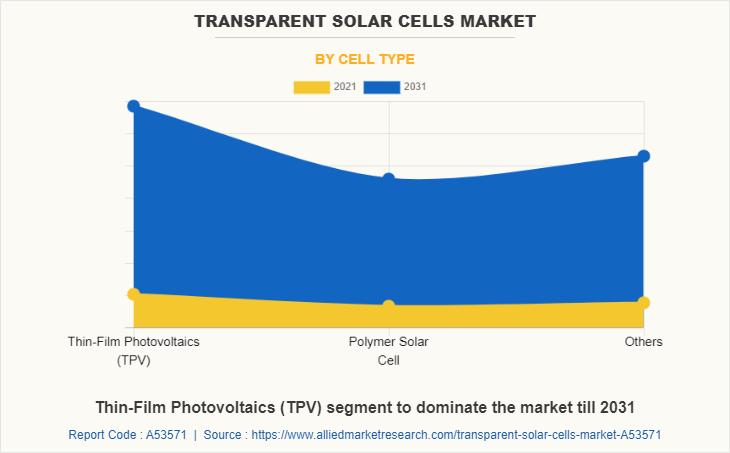
By cell type, it is divided into thin film photovoltaics, polymer solar cells, and others. The thin film photovoltaics segment accounted for the largest revenue share in the global transparent solar cells market in 2021. This growth in demand can be attributed to the progression of the investment of the companies toward the research of new materials and innovative manufacturing processes.
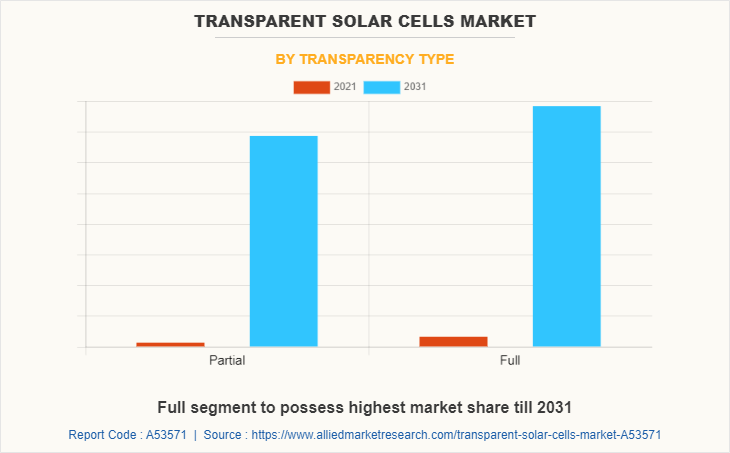
By transparency type, it is bifurcated into partial and full. The full segment accounted for the largest revenue share in the global transparent solar cells market in 2021. This growth in demand for fully transparent solar cells is mostly attributed to the surge in the demand for building integrated photovoltaics and consumer electronics.
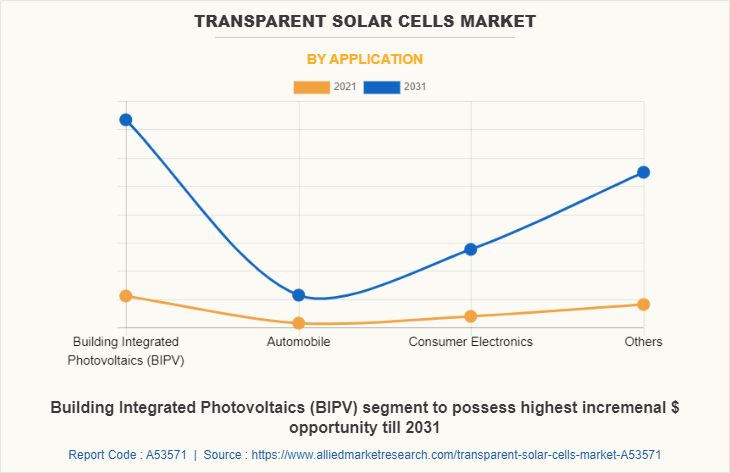
On the basis of application, the building-integrated photovoltaics segment accounted for 45.1% of the transparent solar cells market share in 2021 and is expected to maintain its dominance during the forecast period. This is owing to the increase in the demand for energy-efficient buildings across the globe. Furthermore, ongoing construction activities related to infrastructure in developed and developing countries have a significant impact on the market.
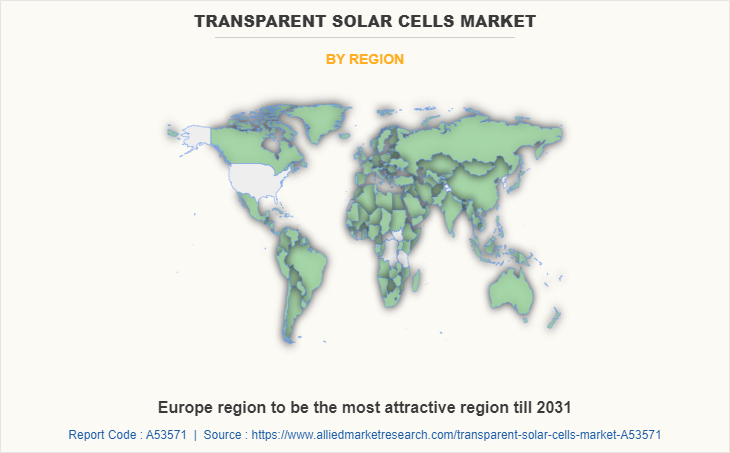
Region-wise, Europe accounted for the largest market share in the market and is projected to grow at a CAGR of 20.8% during the forecast period. Europe has led the way in promoting renewable energy and has established challenging goals for lowering greenhouse gas emissions. Several European nations have set up regulations in place to support renewable energy sources such as solar energy.
For instance, the UK Feed-In Tariff program provides financial incentives for renewable energy projects, and Germany's Renewable Energy Sources Act (EEG) was put into effect to support the development of renewable energy sources. Sustainable building materials are in greater demand in Europe, which is good for the market. The technological advancements in Europe are fueling the expansion of the market. In addition, the presence of major manufacturers of transparent solar cells in this region and ongoing commercialization are anticipated to provide lucrative opportunities for the growth of the transparent solar cells market.
The North America market is analyzed across U.S., Canada, and Mexico. The North America transparent solar cells market is a growing market. The U.S. is the largest market for a transparent solar cells in North America, with a significant share held by companies such as Ubiquitous energy, SolarWind technologies, and Onyx solar energy. The market is growing at a significant pace mostly due to the presence of the increase in the adoption of renewable energy by businesses and consumers, and government initiatives to promote renewable energy. In addition to the above-mentioned factors, the growing demand for energy-efficient buildings in this region is another factor that is expected to boost the development of the market.
Asia-Pacific dominates the transparent solar cells market and is analyzed across China, Japan, India, South Korea, Australia, and the rest of Asia-Pacific. The presence of developing countries in this region is projected to boost the demand for the transparent solar cells market. Countries such as China, Japan, South Korea, and Taiwan are investing in the development of new technologies and manufacturing methods related to transparent solar cells, which have a positive impact on the market. In this region, major countries have initiated several favorable policies for renewable energy, which is driving the adoption of transparent solar cells.
For instance, China has set a target of generating 35% of its electricity from renewable sources by 2030, while Japan aims to achieve a renewable energy mix of 24% by 2030. South Korea has also set a target of increasing its renewable energy generation to 20% by 2030. Such policies are driving the demand for transparent solar cells in the region. In Japan, the National Institute of Advanced Industrial Science and Technology (AIST) and private companies are collaborating on research projects to improve the efficiency of transparent solar cells. In China, the government is supporting the development of transparent solar cell technology through research grants, tax incentives, and other policies.
Brazil, the GCC countries, South Africa, and the rest of LAMEA are all examined for analyzing transparent solar cell market growth. Brazil is one of the key markets for the transparent solar cells market in the LAMEA region. The country has seen significant growth in renewable energy in recent years, with a focus on solar power. The government has implemented policies to promote the use of renewable energy. In addition, Brazil has a large market for green buildings, which is expected to contribute to the growth of the transparent solar cells market in the country.
A transparent solar cell is a relatively new technology that is still in the early stages of development, and as such, its market presence in Saudi Arabia, South Africa, and the Middle East is limited. However, there is growing popularity of this technology due to its potential to provide renewable energy in a more aesthetically pleasing and space-efficient way.
IMPACT OF COVID-19 ON THE GLOBAL TRANSPARENT SOLAR CELLS MARKET
COVID-19 is an infectious disease that originated in the Hubei province of Wuhan city in China in late December 2019. It has spread to 213 countries around the globe, with the World Health Organization declaring it a public health emergency on March 11, 2020. The COVID-19 pandemic had a mixed impact on the transparent solar cells market, with both positive and negative effects. On the negative side, it has caused disruptions in global supply chains and manufacturing operations, which has delayed the production and deployment of transparent solar cells. However, it has also created new opportunities for the market, such as increased demand for sustainable and energy-efficient building materials, and increased awareness about renewable energy and sustainability.
Post-pandemic, the transparent solar cells market is growing at a rapid pace due to the increasing demand for sustainable building materials and the growing awareness of renewable energy. Research and development efforts are also underway to improve the efficiency and durability of transparent solar cells.
Competitive Landscape
Key players in the transparent solar cell industry are Heliatek, Brite Solar, Ubiquitous Energy, Inc., Onyx Solar Group LLC, SolarScape Enterprises Ltd., Xiamen Solar First Energy Technology Co., Ltd., Polysolar, PHYSEE, Sharp Corporation, and Energyglass. These players have adopted various strategies to gain a higher share or retain leading positions in the market.
Key Benefits For Stakeholders
- This report provides a quantitative analysis of the market segments, current trends, estimations, and dynamics of the transparent solar cells market analysis from 2021 to 2031 to identify the prevailing transparent solar cells market opportunities.
- The market research is offered along with information related to key drivers, restraints, and opportunities.
- Porter's five forces analysis highlights the potency of buyers and suppliers to enable stakeholders make profit-oriented business decisions and strengthen their supplier-buyer network.
- In-depth analysis of the transparent solar cells market segmentation assists to determine the prevailing market opportunities.
- Major countries in each region are mapped according to their revenue contribution to the global market.
- Market player positioning facilitates benchmarking and provides a clear understanding of the present position of the market players.
- The report includes the analysis of the regional as well as global transparent solar cells market trends, key players, market segments, application areas, and market growth strategies.
Transparent Solar Cells Market Report Highlights
| Aspects | Details |
| Market Size By 2031 | USD 83.5 million |
| Growth Rate | CAGR of 21.3% |
| Forecast period | 2021 - 2031 |
| Report Pages | 286 |
| By Cell Type |
|
| By Transparency Type |
|
| By Application |
|
| By Region |
|
| Key Market Players | Heliatek, Sharp Corporation, Physee, Xiamen Solar First Energy Technology Co., Ltd., SolarScape Enterprises Ltd, Ubiquitous Energy, Inc., EnergyGlass, Polysolar, Onyx Solar Group LLC, Brite Solar |
Analyst Review
As per CXO Perspective, the global transparent solar cells market is expected to witness increased demand during the forecast period. The surge in the demand for energy-efficient buildings across the globe and the increase in the demand for power from renewable energy significantly impact the market's development.
A transparent solar cell is a new type of solar technology that has the potential to revolutionize the energy industry by allowing solar panels to be integrated into a wide range of applications, from consumer electronics to building materials. These solar cells can be designed to be nearly invisible, which makes them a promising option for integrating solar power into everyday life.
The market is being driven by rising demand for renewable energy, the rapid surge in the technological advancements related to the development of transparent solar cells, and the demand for energy-efficient buildings, and other applications. The presence of an increase in the construction of buildings across the globe with integrated transparent solar cells and the ongoing construction of various iconic buildings in various developing countries have a significant impact on the demand for transparent solar cells. The facts indicate that the transparent solar cells market will expand considerably throughout the projected period.
The global transparent solar cells market is analyzed across North America, Europe, Asia-Pacific, and LAMEA. Among the analyzed regions. The Europe region dominated the transparent solar cells market in 2021. Globally U.S., Germany, China, Australia, and The Netherlands are the major countries with a huge demand for transparent solar cells. Asia-Pacific is expected to have the highest CAGR in the forecast period for the transparent solar cells market.
Increase in urbanization led to a surge in the demand for sustainable energy options and growing consumer awareness positively impacts the transparent solar cell are the key factors boosting the Transparent solar cells market growth.
Rising demand for renewable energy is the Main Driver of Transparent solar cells Market.
Building-integrated photovoltaics is projected to increase the demand for Transparent solar cells Market
Heliatek, Brite Solar, Ubiquitous Energy, Inc., Onyx Solar Group LLC, SolarScape Enterprises Ltd., Xiamen Solar First Energy Technology Co., Ltd., Polysolar, PHYSEE, Sharp Corporation, and Energyglass
The transparent solar cells market is segmented on the basis of cell type, transparency type, application, and region. By cell type, the market is divided into thin film photovoltaics, polymer solar cell, and others. By transparency type, it is bifurcated into partial and full. By application, it is classified into building integrated photovoltaics, automobile, consumer electronics, and others. By region, the market is analyzed across North America, Europe, Asia-Pacific, and LAMEA.
The market value of transparent solar cells in 2031 is expected to be $83.5 million
Post-pandemic, the transparent solar cells market is growing at a rapid pace due to the increasing demand for sustainable building materials and the growing awareness of renewable energy. Research and development efforts are also underway to improve the efficiency and durability of transparent solar cells.
Loading Table Of Content...



